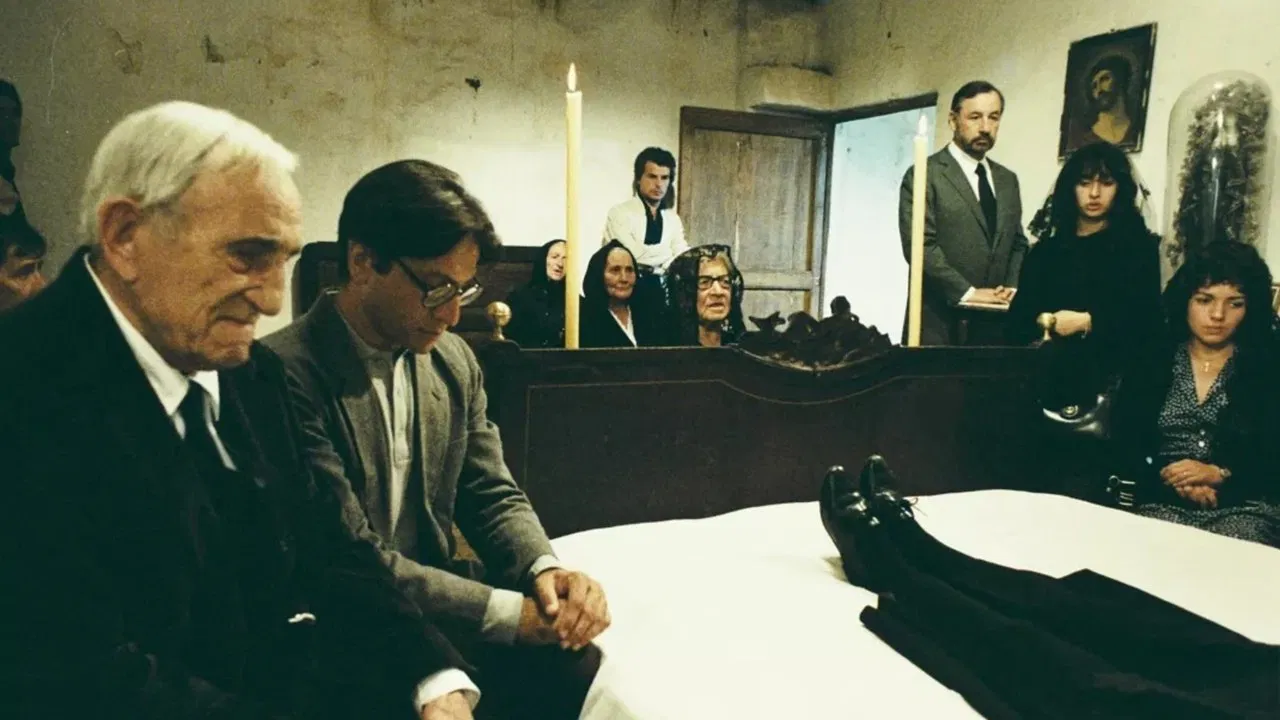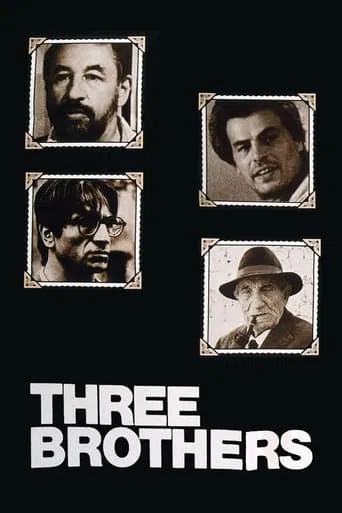

In a farmhouse in southern Italy, an old woman dies. Her husband summons their sons: from Rome, Raffaele, a judge facing a political case for which he risks assassination; from Naples, the religious and ideological Rocco, a counselor at a correctional institute for boys; from Turin, Nicola, a factory worker involved in labor disputes."Three Brothers" is based on a work by Soviet playwright Andrei Platonov and adapted by prolific screenwriter Tonino Guerra ("Blow-Up"). Assisting with the adaptation was director Francesco Rosi, who never seems to have quite achieved the world renown of other Italian directors, despite his highly-praised "The Mattei Affair". Joining Rosi at the helm is two-time Oscar-winning cinematographer Pasqualino DeSantis, who provides a higher quality look than your average Italian film.As a writer myself, what is most striking about the film for me is the adaptation. The original story is set in Russia in the early 20th century, and the new story is set in Italy in the second half of the century. That may not seem like a big deal, but the particulars are certainly quite different. Soviet Russia is in no way the same culturally as Naples or Rome. And yet, the story is flawlessly ported over.Arrow Video brings us an excellent Blu-ray. We have a brand new 2K restoration from original film materials. The key special feature is an archival audio interview with Francesco Rosi from 1987. Any scholar of Rosi will appreciate this conversation that runs over an hour. We also get a booklet featuring an essay by Millicent Marcus, a 1981 interview with Rosi and a selection of contemporary reviews. Unfortunately, there is no commentary, nor any interview with star Michele Placido, but this is still a fine release nonetheless for an otherwise neglected film.
... View MoreFrancesco Rosi's "Tre fratelli" looks at three brothers who return to their childhood home after their mother dies. The movie goes into a study of the dissimilar paths that their lives have taken them. Raffaele (Philippe Noiret) is a judge prosecuting individuals charged with terrorism; Nicola (Michele Placido) is a union leader who supports the people targeted by Raffaele; and Rocco (Vittorio Mezzogiorno) works in a correctional institute for boys. But even beyond the different paths that the brothers' lives have taken them, the movie looks at their relationship (or lack thereof) with their father (Charles Vanel). It turns out that only the granddaughter is truly able to bond with the patriarch.The movie is almost mystifying in its focus on this family. Raffaele's dream brings up the issue of what constitutes terrorism. But in the end, all sides are forced to recognize that they are still a family. The granddaughter seems to represent the innocence that the brothers were forced to abandon as they went their separate ways in life. The end result is a very thought-provoking movie, definitely one that I recommend.
... View MoreRossi touches the spectator with a movie that is part the modern Italy, being the way of living of the three brothers, and the old and more rural Italy, the lifestyle of Donato, the father. "Tre fratelli" is a melancolic piece of art, the way Donato remembers his wife and how Marta can remember him of his wife. The relationship between the three brothers is seemed to be tense due to the differences between them until Raffaele asks Rocco about his sexual life...something that always seem to break tension between brothers or friends. It is very interesting how all the adults have a dream or a memory and therefore we are told part of the story that way, such as the real fear of Nicola to be killed or the willingnes of Rocco to help the problematic kids.Another Rossi piece of art in a simple and poetic way.
... View MoreAn old man goes to the telegraph office and transmits the news of the decease of their mother to his three sons, who live scattered all over Italy. So much for the initial situation, which Rosi has taken from a Platonov story.The sons, who then arrive one by one in the South Italian village of the father, are far apart from each other, not only concerning their age. They have also taken completely different roads in their professional careers and in their spiritual developments. The first one, a judge, has to deal with terrorist cases and every day has to reckon with being killed cold-bloodedly by the mafia. The second one could almost be one of the terrorists himself, at least he strives for societal changes, being a worker and a trade union member. The third one has dedicated his life completely to the fulfilment of utopian educational targets and looks after maladjusted juvenile delinquents in a boarding school.The Italy presented by Rosi is as disunited as the chosen family. It is not only geographically split into two incompatible halves, the North and the South, but also sociologically into different classes that stand facing each other irreconcilably. But "Tre fratelli" has more to offer than just regional or social conflicts. Life itself becomes the center of attention, apart from the three brothers, who represent middle age, also the old father and his eight-year-old grand-daughter are dominating protagonists. These two are able to form a curious alliance of old age and youth, whereas the brothers are just talking at cross purposes in senseless discussions and only reach a sentiment of unison through the mourning at their mother's funeral.The little girl wants to know a lot about the past, and the old man is willing to remember. He finally recalls the perhaps most blissful moment of his life: Shortly after his wedding he accompanies his wife to the beach, where they both enjoy a short spell of light-heartedness, just before the hard struggle of earning one's living will demand all their forces. There the woman is playing in the sand, lost in thought, but then she suddenly rouses from her daydream and calls out the name of her husband: She can't find her wedding ring, which she has removed accidentally, and now it seems to be lost in the sand. Everything is at stake, but tragedy can be averted for the man keeps his cool, rushes to the next house and comes back with a sieve. A little later he holds the recovered ring in his hands triumphantly.This event seems to have been meaningful for the further living together of the couple, only the late arrival of Death intervenes in this apparently undisturbed harmony. The feelings of the old man are now marked by sorrow and grief because of the loss, but not by bewilderment or anger. These are the laws of Nature, which he has to obey. In the last take he therefore just slips on that ring again, the ring that signifies one thing in particular to this man who is about to reach the end of his journey. It shows him the reality of his life, that short spell of time that has slipped away so incredibly fast but of which at least he has the comforting certainty of having used it well.
... View More